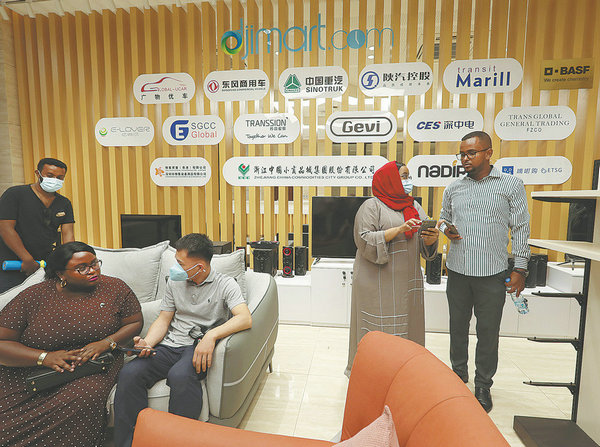

"When you are in China, you don't realize how much you are absorbing and learning and how much you are adapting to a very fast-paced and high technological society," Deliah Nalukwago, a young Ugandan entrepreneur, says, as she recalls her 11 years in China.
"I would say China helped awaken my entrepreneurial spirit. When you come back to Africa, for every problem you see a solution because you have that reference point from life in China," says Nalukwago. She was among nearly 30 young African entrepreneurs from Djibouti, Ethiopia, Kenya and Uganda, who learned business operations and shared their entrepreneurial experiences during an eight-day training program supported by Chinese enterprises.
The first training camp at the Center of Innovation and Maritime Excellence, in which Nalukwago participated, with the theme "Digital innovation and cross-border e-commerce", ended last week in the capital of Djibouti.
After graduating from high school, she applied for a scholarship in China, where she earned a bachelor's degree in medicine and a master's degree in traditional Chinese medicine.
She returned to Uganda after completing her studies and founded a healthcare technology startup in the capital city Kampala in 2019 called My Musawo, which means "my doctor" in Luganda, the main local language. The company's eponymous mobile app, launched in May, works with the Uganda Medical and Dental Practitioners Council to provide users with professional online consultation services and healthcare advice.
It was TCM and a Chinese doctor that set her on her path to study medicine. "When I was 8 years old, my mother had a nerve disorder and all options with Western medicine failed. That's when she met our family doctor, and the first TCM doctor in Uganda." After acupuncture and massage therapy for a few months, her mother returned to normal, and the TCM doctor cured Nalukwago's chronic asthma. "He was like a mentor to me and inspired me to enter the medical field, particularly in China to study the TCM that helped my mother."
After having gained her undergraduate degree, she took a year off to intern at a hospital in Uganda. This yearlong experience allowed the young African, excited to live out her dream career, to realize that the local healthcare system needed to be improved in terms of efficiency and management and how to help with her own contribution, she says, adding that she saw how quickly people in China could get the medical information and advice they needed through the internet and mobile apps. Coupled with the rapid smartphone penetration in Uganda and across Africa, it inspired her to work with her partners to develop an app to help more Ugandans.
Another camp participant is Nael Hailemariam, a young Ethiopian also with entrepreneurial ties to China. After receiving a master's degree from Tsinghua Shenzhen International Graduate School in China, he returned to his home country to start a digital finance company that provides online payment services.
Hailemariam says that China's culture of innovation and efficiency had a profound impact on his entrepreneurial endeavors and that he was inspired by China's great success in e-commerce. He also organized a trip to Ethiopia in 2019 for Tsinghua University students from China for exchanges in science, innovation and culture with young local entrepreneurs. "I want to help Chinese students understand Africa, but more importantly, I want African youth to understand Chinese development and Chinese speed," he says.
According to the participants, the camp helps entrepreneurs who lack technical and business backgrounds to learn relevant knowledge, and also creates a network for young African entrepreneurs to interact with peers from different backgrounds for future cooperation. "We young people are the future of Africa; we have to seize all resources and opportunities to build Africa," says Mahad Abdourazak, a participant from Djibouti, who expressed his happiness for the opportunities China has been providing for young entrepreneurs on the continent in recent years.
As a world leader in the digital innovation industry, China provides experience and technical support for Africa's digital economy development from e-commerce, digital infrastructure, to mobile application and payment. Inspired by their experiences in China, some African youth will be the driving force behind their country's constantly evolving digital economy and will innovate with local needs in mind.
Talking about the cooperation between China and Africa in youth innovation, Nalukwago believes that "China is a good partner for us". She says that China not only funds many large-scale projects in Africa, but also reaches out to young African entrepreneurs. "African youth will be the future of the continent, and I am glad to see that they are willing to understand and help us grow."